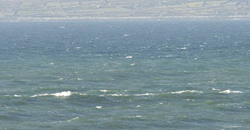Slow Food International has reiterated its position on fish farms, stating that the organisation “does not consider open net pen fish farms an environmentally sound practice”.
The group made the statement ahead of any decision by the Department of Agriculture, Food and the Marine on whether or not to grant a license to Bord Iascaigh Mhara for a giant salmon farm off the North Clare Coast.
The movement said it wished to “reiterate its opposition to intensive open pen fish farms, correcting any misconception resulting from the mention of Slow Food in the Environmental Impact Statement published by BIM”.
Piero Sardo, president of the Slow Food Foundation for Biodiversity, confirms, “Open net pen aquaculture is not a solution to the problem of overfishing: It damages natural ecosystems on a local and a global level, including wild stocks, habitats and water quality. Feeding carnivorous salmon in farms means other wild species must also be harvested, resulting in a larger carbon footprint – since the fish feed must be fished, processed and transported”.
In a statement, Slow Food acknowledged the value of traditional wild salmon and said it would like to see political action to help preserve this threatened species. It said it wanted to see effective conservation programs implemented instead of “putting further pressure on stocks with intensive farm operations.”
“If you must farm salmon, then at least reduce the local impact by using closed pens removed from the marine open environment,” Sardo adds.
John Volpe, PhD, director of the School of Environment at the University of Victoria in British Columbia, also expresses his opinion in this regard. “The independent scientific community speaks with a single voice; open net pen salmon farms are not only a net loss of marine resources and human food but threaten our collective marine environment with potentially irreversible damage. Governments that continue to support this industry, in spite of overwhelming contrary ecological, social and economic evidence, do so at their – and our – peril”.
“Amoebic Gill Disease (AGD), one of numerous farm pathogens potently catastrophic to already threatened wild salmon is once again infecting open cage installations along the west coast. The threat is widespread and clearly not under control; from Bantry Bay in Cork to Mulroy Bay in Donegal, as well as the BIM’s flagship open cages at Clare Island, Co Mayo; this is typical of the information that the public has not been made aware of,” a statement from Slow Food International outlined.
Environmental groups and anglers opposed to the proposed Galway Bay farm have welcomed the clarification.
Nicola Corless


